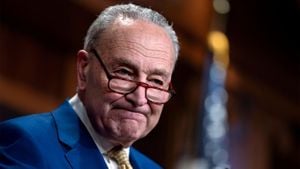Hospitality workers at the Virgin Hotels Las Vegas have embarked on a significant strike, marking the first open-ended walkout by the Culinary Workers Union (CWU) in over two decades. This strike began early Friday morning, November 15, 2024, and has seen around 700 non-gaming employees—from housekeepers to restaurant staff—walk off the job. The catalyst for this action was the breakdown of negotiations for a new contract, which left workers feeling undervalued at the off-Strip resort.
The stakes are particularly high as the Las Vegas Grand Prix draws near, just days away, adding urgency to the workers’ demands for improved pay and conditions. Virgin Hotels, located less than a mile from Grand Prix Plaza, has not only connections with this high-profile event but also engages with the tourist influx it brings. This makes the timing of the strike even more significant.
Union representatives indicated the strike stems from more than just financial concerns—workers are also seeking enhanced workplace protections. They argue the current financial proposals from Virgin Hotels are not enough to keep pace with the cost of living increases faced by workers. Ted Pappageorge, Secretary-Treasurer of the Culinary Union, outlined their demands for raises comparable to those received by workers at other resorts, pointing to The STRAT Hotel which offered its non-tipped employees over $4.00 per hour wage increases this year alone.
During the latest round of negotiations, the CWU was left disheartened after the company’s offer calculated to just approximately $0.30 wage growth per year over five years after considering benefits. "The idea one company of wealthy private equity investors can decide to come and destroy the standards of Las Vegas—these workers aren't putting up with it," Pappageorge asserted passionately.
The tensions came to a head following months of bargaining sessions, culminating last Thursday when the union and management could not reach an agreement. Up until this point, the culinary workers had engaged the company with the hope of securing fair wage increases through several rounds of negotiations. Virgin Hotels, on its part, characterized the union’s approach as insisting on stances not financially reasonable for the property, leading to mounting frustration on both sides.
Adding to the narrative is the historical backdrop, as this strike is now the largest action of its kind since the last major union strike back in 2002 at the now-closed Golden Gate Hotel. Previously, the Culinary Union had only staged shorter strikes or temporary walkouts to put pressure on hotel management for more favorable terms. Just earlier this year, workers at Virgin staged a 48-hour strike to draw attention to stalled contract talks, which they viewed as ineffective without follow-up actions.
Many employees, such as Tim McKeever, voiced concerns for their non-tipped colleagues who are feeling the economic pinch the hardest. With high inflation rates and rising grocery costs, he remarked, “Everybody else that's a non-tipped employee, they're suffering. They’re way behind the rest of the economy.” Maria Mendoza, another long-time employee, shared her struggles with the current economic climate, explaining, “Everything has gone up, except for our wages,” asserting her intention to leave if the situation does not improve soon.
At this point, Virgin Hotels claims to have proposed some wage increases to take effect before the fourth year of their latest contract. Yet, the union dismissed this as not substantial enough to meet the pressing needs of its members. The Culinary Union's prior successful agreements—like those providing for 32 percent salary increases across various major Strip properties—underscore how the company stands out for its inadequacy to meet present wage expectations.
The significance of the Virgin Hotels dispute transcends just the entities involved; it highlights the tension between corporate profitability and labor rights. With hospitality being deeply intertwined with the identity of Las Vegas, the results of this conflict could send ripples through the broader industry. The union has called on customers to be mindful of the situation, asking them not to cross the picket lines and urging them to support unionized establishments instead.
Despite the pressures of the impending grand prix and the clear financial capabilities of Virgin Hotels—apparently backed by private equity firms possessing over $11 billion in assets—the reluctance to provide fair compensation has the community questioning the industry’s values.
Currently, the strike continues without resolution as both sides remain at odds, with union leadership urging for persistence until their demands are met. For the estimated 700 employees involved, this strike is about more than just wages; it is about recognition, respect, and the pursuit of fair treatment within one of America's most iconic hospitality landscapes.
This is clearly not just another labor dispute; it is representing the collective voices of workers insisting to be seen and valued appropriately during an economically challenging period.



